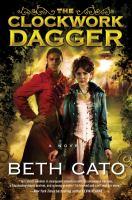
While steampunk as a subculture may be best known for corsets, goggles, and extraneous decorative gears, beneath those trappings is rich fodder for fiction often featuring plucky female protagonists--and publishers have certainly been taking note. Beth Cato's The Clockwork Dagger is one such tale, complex enough to entice existing steampunk fans but approachable enough to those new to the genre.
All the requisite trappings are present here—a spunky heroine, airships, an alternate universe where scientific progress exists alongside older magic. Heroine Octavia is a "medician," a Druidic doctor whose connection with The Lady (a healing goddess of sorts) is particularly strong. This leaves her the target of assassins, or Clockwork Daggers, as they are known, as she sets off to take a post in a city traumatized by plague and war. Her traveling companions include Mrs. Stout, a writer of lurid pulp tales with a few secrets of her own, and the enticing Alonzo Garrett, a hunk with one mechanical leg and an irresistible attraction to her.
Assassination attempts, mythology, first love, and in the backdrop, war—these should make for an appealing tale, and to a large extent, they do. The most intriguing part of the story, to me, was the backdrop, by parts bustling industrial cities and, in other parts of the world, post-apocalyptic wastelands. Octavia has tended to soldiers at the front and seen firsthand the horrors of war and what it does to people, which is a dynamic I haven’t seen frequently in steampunk fiction. The different magic systems were also fascinating—while her own magic is of the healing variety, Octavia also encounters “infernals,” mages who can wield fire (naturally, they are among the ranks of the villains, a pity since what little was revealed of them would have indicated some intriguing cultural attitudes had they not been filtered through Octavia’s biased lens). Fantasy tends to be filled with warriors and rangers and spellcasters, but stories featuring healers in leading roles are rarer; in that aspect, I appreciate the niche The Clockwork Dagger fills.
Unfortunately, Octavia is the crux of my problems with this story. It seems that each feat she can accomplish with ease is met with increasing astonishment at her talents by lesser mortals. By about the third reminder of her exceptional abilities, it becomes tiresome. I love a strong heroine as much as the next reader, but by the end of the book readers wonder if there is anything Octavia can’t do. Perhaps those are matters for another tale.
The Clockwork Dagger is clearly the setup for a planned series, a duology in this case with the second book due out this year in June. And while the characterization could use a bit of development, the worldbuilding here hints at much more promising fare.
